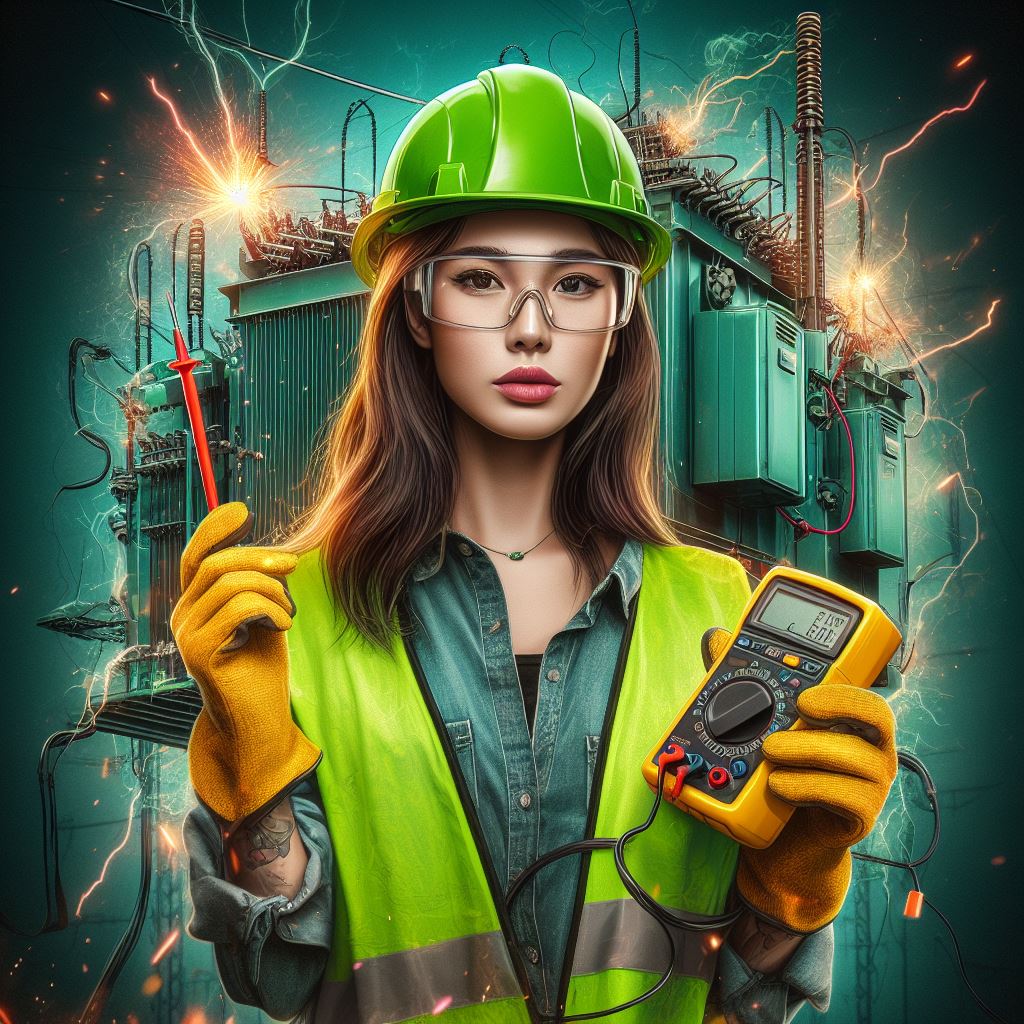Introduction
The electrician profession has traditionally been male-dominated, but women in this field are now gaining spotlight.
It is important to highlight their presence in traditionally male-dominated professions.
In this section, we will discuss the significance of women in the electrician profession and explore the main points related to this topic.
The number of women entering the electrician profession has significantly increased in recent years.
This shift challenges societal norms and breaks down gender stereotypes.
We will shed light on the achievements and contributions of women electricians.
By showcasing successful women in this field, we aim to inspire more women to pursue careers in traditionally male-dominated professions.
This section also aims to address the challenges faced by women in this profession.
We will explore how the industry can promote gender diversity and create more inclusive work environments.
Furthermore, we will discuss the importance of mentorship and support networks for women electricians.
Highlighting the work of women in the electrician profession will encourage more gender equality in the field.
This section will share success stories and strategies for empowering women in this traditionally male-dominated profession.
By focusing on women electricians, we hope to inspire discussions and foster positive change in the industry.
In short, it is crucial to bring women in the electrician profession into the spotlight.
By promoting diversity and equality, we can create a more inclusive and progressive workforce.
Historical Context
Early challenges faced by women in the electrician profession.
Examples of pioneering women who broke barriers and made significant contributions.
Impact of cultural and societal norms on women’s participation in the profession.
Breaking the Mold: Women in the Electrician Profession
In the electrician profession’s early years, women confronted myriad challenges in a traditionally male-dominated field.
Male counterparts’ prejudice and skepticism posed significant obstacles, asserting women’s supposed physical inadequacy and technical incompetence.
Transform Your Career Today
Unlock a personalized career strategy that drives real results. Get tailored advice and a roadmap designed just for you.
Start NowUndeterred, pioneering women defied societal expectations, making impactful contributions.
Emily Warren Roebling, overseeing the Brooklyn Bridge construction, challenged gender norms, inspiring future generations.
Edith Clarke, the first female U.S. electrical engineer, revolutionized power engineering with the Clarke Calculator.
Despite these trailblazers, cultural norms restricted women’s participation in the electrician profession, portraying them as unsuitable.
Societal expectations prioritized women’s roles as wives and mothers over careers, limiting opportunities.
Over time, the electrician profession embraced diversity, breaking down barriers through initiatives promoting inclusivity.
Today, women electricians excel, disproving stereotypes and reshaping the industry’s perception.
Despite progress, challenges persist, necessitating ongoing efforts for equal opportunities.
Acknowledging women’s achievements inspires future generations to pursue electrician careers regardless of gender.
The historical context illuminates challenges, influential figures, and cultural impacts on women in the profession.
Celebrating women’s accomplishments fosters equality and propels the electrician field toward a more inclusive future.
Read: The Future of Electric Work: Trends & Predictions
Changing Landscape
In recent years, a surge in women joining the electrician profession signals a transformative shift.
Increased awareness and support drive this change as more women recognize the career’s potential.
Traditionally male-dominated, the electrician field now undergoes a substantial demographic transformation.
The heightened awareness and support for women in male-dominated sectors fuel this shift.
Organizations and initiatives supply resources like scholarships, mentorship, and networking, dismantling barriers and stigmas.
A diverse electrician workforce offers varied skills, perspectives, and innovative ideas.
Women contribute unique talents, enhancing the industry’s well-rounded nature and fostering innovation.
Studies reveal diverse teams excel, improving problem-solving and decision-making.
Transform Your Career Today
Unlock a personalized career strategy that drives real results. Get tailored advice and a roadmap designed just for you.
Start NowFemale electricians showcase competence, excelling in technical projects and customer interactions, challenging stereotypes.
Progress notwithstanding, there’s ongoing work to boost women’s representation in the field.
Encouraging young girls in male-dominated industries requires expanded mentorship programs and awareness campaigns.
Education plays a pivotal role in dismantling early gender biases and stereotypes.
The electrician profession’s landscape evolves with women thriving, breaking barriers, and fostering an inclusive, innovative environment.
Continued efforts promise further success, solidifying women’s presence and triumphs in the electrician profession’s future.
Read: Balancing Work & Life: An Electrician’s Perspective

Challenges Faced by Women in the Electrician Profession
In the electrician profession, women face a unique set of challenges that can hinder their success and growth in the industry. These challenges include:
1. Gender Bias and Stereotypes
- Women often have to struggle with gender bias and stereotypes that portray them as less capable than men in technical fields like electrical work.
- They may face doubts about their physical strength or technical skills, making it harder for them to gain trust and respect from colleagues and clients.
- These biases and stereotypes can limit women’s opportunities for career advancement and lead to lower wages compared to their male counterparts.
2. Limited Mentorship and Career Advancement Opportunities
- There is a lack of female mentors in the electrician profession, making it harder for women to find guidance and support from those who have gone through similar experiences.
- Mentorship is crucial for career development and advancement, as it provides guidance in navigating challenges, gaining new skills, and seizing opportunities.
- Without sufficient mentorship and role models, women may find it harder to envision themselves in higher positions or pursue leadership roles within the industry.
3. Unequal Access to Training and Education
- Women may face barriers in accessing training and education programs in electrical work due to various reasons, such as financial constraints or societal expectations.
- The lack of equal access to training and education can create a skills gap between men and women in the industry, further reinforcing gender disparities.
- Addressing this issue requires initiatives that provide financial support and targeted programs to encourage more women to pursue education and training in electrical work.
4. Safety Concerns
- In some cases, women may face safety concerns while working as electricians, especially if they are assigned to work in remote or high-risk areas.
- It is essential to ensure that women have access to proper safety measures, training, and support to perform their duties without compromising their well-being.
- Creating a safe and inclusive work environment is crucial to attracting and retaining women in the electrician profession.
5. Lack of Representation
- The underrepresentation of women in the electrician profession is itself a significant challenge.
- When women do not see many others like them in the industry, they may feel discouraged or doubt their capabilities to succeed in a male-dominated field.
- Increasing the visibility of successful women electricians and promoting their achievements can inspire more women to enter and thrive in the profession.
To overcome these challenges, the electrician industry needs to develop strategies that promote gender equality, such as:
- Implementing awareness and diversity training programs to tackle biases and stereotypes within the industry.
- Creating mentorship programs that connect women electricians with experienced professionals who can guide and support them in their careers.
- Advocating for equal access to training and educational opportunities for women in electrical work.
- Ensuring workplace safety measures are comprehensive and inclusive, addressing the specific risks faced by women in the profession.
- Encouraging more women to pursue careers in electrical work through targeted recruitment efforts, scholarships, and support networks.
By addressing these challenges and promoting inclusivity, the electrician profession can tap into a broader talent pool, benefit from diverse perspectives, and create a more equitable industry for women.
Read: Tools of the Trade: Must-Have Gear for Electricians
Success Stories
Electricians are often seen as a male-dominated profession, but women have made significant strides in this field, defying stereotypes and achieving great success.
In this section, we will explore inspiring stories of women who have excelled in the electrician profession, highlighting their achievements, career growth, and contributions.
These women serve as role models for aspiring female electricians, showing them that they too can thrive in this industry.
1. Samantha Roberts – Breaking Barriers
Samantha Roberts, a trailblazer in the electrician profession, faced numerous challenges as she pursued her career.
Despite societal expectations, Samantha’s passion for electrical work drove her to excel. Starting as an apprentice, Samantha quickly stood out for her exceptional skills and dedication.
Within five years, she became a recognized journeywoman.
Samantha’s achievements serve as an inspiration to aspiring female electricians, proving that hard work and determination can break barriers and shatter stereotypes.
2. Sarah Henderson – Climbing the Ladder
Sarah Henderson’s story is a testament to the potential for career growth in the electrician profession.
Starting as a residential electrician, Sarah’s commitment and expertise caught the attention of her superiors.
Transform Your Career Today
Unlock a personalized career strategy that drives real results. Get tailored advice and a roadmap designed just for you.
Start NowRecognizing her potential, Sarah was given the opportunity to work on large-scale commercial projects.
Through continuous learning and perfecting her craft, Sarah eventually became a project manager, overseeing multi-million dollar electrical installations.
Sarah’s journey showcases the upward mobility available to women in the electrician profession.
3. Emily Thompson – Empowering the Community
Emily Thompson’s achievements as an electrician go beyond personal success.
She has dedicated her career to empowering the community through electrical work.
As a licensed electrician, Emily started a non-profit organization that provides free electrical services to low-income households.
Through her organization, Emily has improved the lives of countless individuals by ensuring their access to safe and functional electrical systems.
Her story demonstrates the potential for electricians to make a positive impact on society.
4. Jessica Ramirez – Innovating for Sustainability
Jessica Ramirez’s success as an electrician lies in her commitment to sustainable practices.
Recognizing the importance of energy conservation, Jessica has become a pioneer in implementing eco-friendly electrical solutions.
Her expertise in solar panel installations has earned her recognition in the industry.
Jessica is not only contributing to a greener future but has also built a thriving business around sustainable electrical solutions.
Her story serves as an inspiration to aspiring female electricians who want to make a difference in environmental sustainability.
5. Olivia Martinez – Mentorship and Advocacy
Olivia Martinez has not only excelled in her own electrical career but has also dedicated herself to mentoring and advocating for aspiring female electricians.
Through her leadership in various industry organizations, Olivia has fought for equal opportunities and fair representation for women in the profession.
Olivia’s commitment to mentorship has shaped the careers of many aspiring female electricians, providing them with the guidance and support they need to succeed.
Her story exemplifies the importance of uplifting and empowering others in the field.
These success stories highlight the incredible achievements of women in the electrician profession.
From breaking barriers and climbing the career ladder to empowering communities and innovating for sustainability, these women have proven that gender is not a limitation in this field.
They serve as shining examples and role models for aspiring female electricians, showing that with passion, perseverance, and dedication, anything is possible.
Transform Your Career Today
Unlock a personalized career strategy that drives real results. Get tailored advice and a roadmap designed just for you.
Start NowRead: Safety First: Common Hazards Electricians Face Daily
Support and Empowerment
The electrician profession has traditionally been male-dominated, making it crucial to create a supportive environment for women in this field.
By focusing on initiatives, organizations, and providing resources, we can empower women to succeed in the industry.
The Importance of a Supportive Environment
- Eliminating gender bias and promoting inclusivity is essential for women to thrive in the electrician profession.
- Supportive workplaces foster collaboration, respect, and equal opportunities for professional growth, benefiting all employees.
- Mentorship programs can play a significant role in creating a supportive environment by connecting experienced professionals with women entering the industry.
- Encouraging women to enter the electrician profession helps address the gender imbalance and brings diverse perspectives to the field.
Initiatives and Organizations Empowering Women
- There are various initiatives and organizations specifically dedicated to empowering women in the electrician profession.
- Non-profit organizations such as Women in Trades, Women in Construction, and Women in Science and Engineering provide support, networking, and advocacy for women.
- These organizations organize workshops, conferences, and mentorship programs to help women in their career development.
- Employers can also establish internal initiatives like diversity and inclusion programs to support and empower their female employees.
Resources and Tools for Success
- Women entering the electrician profession can access a range of resources and tools to help them succeed.
- Trade schools, vocational training programs, and apprenticeships offer comprehensive training and education for aspiring electricians.
- Online platforms and websites provide information, support forums, and educational materials tailored to women in the industry.
- Financial assistance, scholarships, and grants are available to support women in pursuing education and training in the electrician field.
Creating a supportive environment, promoting gender inclusivity, and empowering women in the electrician profession are critical steps towards achieving gender equality in the industry.
By implementing initiatives, organizations, and providing resources, we can offer women the tools they need to succeed and thrive in this traditionally male-dominated field.
Conclusion
In this section, we have explored the topic of women in the electrician profession.
We discussed the challenges they face and the progress made in breaking gender stereotypes.
It is important to encourage more women to consider a career in this field.
Women have proven their capabilities and can excel in traditionally male-dominated careers.
By spotlighting women in these professions, we challenge societal norms and create greater diversity and equality in the workplace.
It is crucial to continue advocating for women in these fields and providing support and opportunities for their success.
Embracing and celebrating their achievements highlights the significance of empowering women and creating a more inclusive society.
We must remember that talent and skill have no gender boundaries, and women have the potential to thrive in any profession, including as electricians.
Let us inspire more women to pursue their passion, break barriers, and pave the way for a better future.
[E-Books for Sale]
The Big Book of 500 High-Paying Jobs in America: Unlock Your Earning Potential
$19.99 • 500 High-Paying Jobs • 330 pages
Explore 500 high-paying jobs in America and learn how to boost your career, earn more, and achieve success!
See All 500 High-Paying Jobs of this E-Book
1001 Professions Without a Degree: High-Paying American Jobs You Can Start Now
$19.99 • 1001 Professions Without a Degree • 174 pages
Discover 1001 high-paying jobs without a degree! Unlock career tips, skills, and success strategies for just $19.99!




